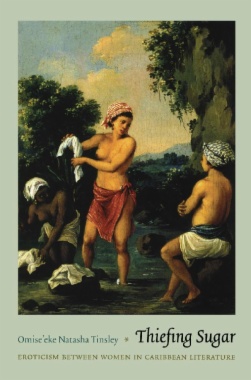In Thiefing Sugar, Omise’eke Natasha Tinsley explores the poetry and prose of Caribbean women writers, revealing in their imagery a rich tradition of erotic relations between women. She takes the book’s title from Dionne Brand’s novel In Another Place, Not Here, where eroticism between women is likened to the sweet and subversive act of cane cutters stealing sugar. The natural world is repeatedly reclaimed and reinterpreted to express love between women in the poetry and prose that Tinsley analyzes. She not only recuperates stories of Caribbean women loving women, stories that have been ignored or passed over by postcolonial and queer scholarship until now, she also shows how those erotic relations and their literary evocations form a poetics and politics of decolonization. Tinsley’s interpretations of twentieth-century literature by Dutch-, English-, and French-speaking women from the Caribbean take into account colonialism, migration, labor history, violence, and revolutionary politics. Throughout Thiefing Sugar, Tinsley connects her readings to contemporary matters such as neoimperialism and international LGBT and human-rights discourses. She explains too how the texts that she examines intervene in black feminist, queer, and postcolonial studies, particularly when she highlights the cultural limitations of the metaphors that dominate queer theory in North America and Europe, including those of the closet and “coming out.”
- Contents
- Acknowledgments
- Introduction: The Spring of Her Look
- 1. “Rose is my mama, stanfaste is my papa”: Hybrid Landscapes and Sexualities in Surinamese Women’s Oral Poetry
- 2. Darkening the Lily: The Erotics of Self-Making in Eliot Bliss’s Luminous Isle
- 3. Blue Countries, Dark Beauty: Opaque Desires in the Poetry of Ida Faubert
- 4. At the River of Washerwomen: Work, Water, and Sexual Fluidity in Mayotte Capécia’s I Am a Martinican Woman
- 5. Transforming Sugar, Transitioning Revolution: Male Womanhood and Lesbian Eroticism in Michelle Cliff’s No Telephone to Heaven
- 6. Breaking Hard against Things: Crossing between Sexual and Revolutionary Politics in Dionne Brand’s No Language Is Neutral
- Notes
- Bibliography
- Index

